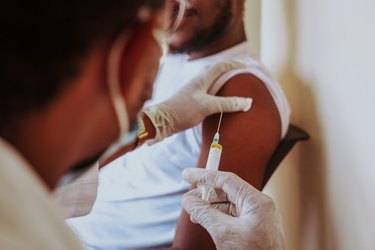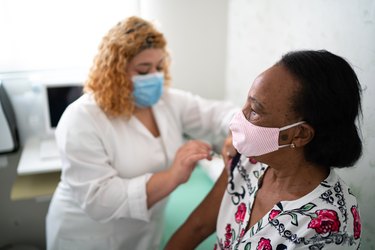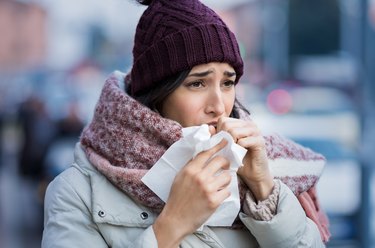
While the COVID-19 vaccine may have taken center stage the last few years (and for good reason), the flu shot has been (and still is) a crucial annual ritual.
According to flu statistics, the virus kills hundreds of thousands of people every year. And with COVID-19 still circulating, there continues to be a risk of co-infection, which can be risky for even the healthiest people.
Video of the Day
Video of the Day
Bottom line: The flu shot is important for everyone. Read on to learn more about its effectiveness, when to get a flu shot and other things to expect from the jab.
First, Does the Flu Shot Work?
In the past, many of us haven't lined up to get the vaccine. During the 2022-2023 flu season, for example, less than half of all adults (47 percent) even bothered to get jabbed, according to the Centers for Disease Control and Prevention (CDC).
One of the reasons, says Margot Savoy, MD, MPH, senior vice president for education for the American Academy of Family Physicians, is the belief that the flu shot isn't effective.
It's true that a flu shot won't offer you total protection: For example, in the 2022-2023 flu season, vaccine effectiveness was about 54 percent, per the CDC. (It's typically between 40 and 60 percent effective, per the CDC.)
But research shows that getting the vaccine can make a big difference in the grand scheme of things.
During the 2021-2022 flu season, for example, people vaccinated for the flu had a 26 percent lower risk of intensive care unit admission at the hospital and a 31 percent lower risk of death from flu compared to those unvaccinated, per the CDC.
An August 2022 study in Clinical Infectious Diseases found that flu vaccination reduced children's risk of severe, life-threatening influenza by 75 percent.
Plus, according to a June 2021 Vaccine review, getting jabbed lowers your risk of death from the flu by nearly a third.
This is particularly key for older adults and people who are pregnant, both of whom are especially vulnerable to the flu, William Schaffner, MD, an infectious disease specialist at the Vanderbilt University School of Medicine, tells LIVESTRONG.com.
Flu vaccines have reduced the risk of flu-associated hospitalizations among both groups by about 40 percent, per the CDC.
"While the shot can't completely protect against the disease, it does offer some immunity, so if you do get it, your symptoms will most likely be less severe," Dr. Schaffner adds.
Is the Flu Vaccine Safe?
While it is possible to have an allergic reaction to a flu shot, it's very, very rare — only 10 cases of life-threatening anaphylaxis have been recorded for more than 7.4 million doses of flu vaccine given, according to the CDC.
In fact, starting in the 2023-2024 season, additional safety measures (beyond the typical measures for everyone) are no longer recommended for people with egg allergies getting the flu vaccination, per the CDC.
"You've got a much greater chance of being hospitalized or dying from the flu than having an allergic reaction to it," Dr. Savoy says.
When Should You Get a Flu Shot This Year?
In general, the best time of year to get the flu shot is early fall (i.e., around the end of October), according to the CDC. This gives your body a couple weeks to develop immunity before flu really hits, while also being late enough to make sure immunity doesn't wear off completely by March or April, Dr. Schaffner says.
In other words, the shot's protective effects wane over time, so you want to time things right in order to get the best protection during peak flu season.
Of course, flu patterns can vary a bit depending on where you live. It may be helpful to check out the CDC's map of flu activity by state during the past 12 months to get a sense of when the flu is most prevalent in your area.
If you miss the mark, don't panic — you can still reap the benefits of a flu vaccine later in the season. Even January or February isn't too late to get vaccinated, because the flu tends to circulate through early spring.
"It's true that seasonal flu usually peaks between December and March, but it can occur as late as May," Dr. Schaffner says, adding that he has vaccinated patients through April.
Tip
Countries in the Southern Hemisphere tend to experience flu season between April and September, per the CDC. If you're planning a trip there in that timeframe, ask your doctor about getting a flu vaccine before you travel.
Your Step-by-Step Guide to Getting a Flu Shot
1. Make an Appointment
The good news is that it's very easy to get a flu shot. It's available not only at your doctor's office, but also at most pharmacies, city health departments and even local Planned Parenthood clinics. (To find the location nearest you, check the VaccineFinder website.)
Once you've made an appointment, you should be able to fill out any paperwork online in advance. This will help cut down on the time you have to spend in the doctor's office or pharmacy.
How to Get a Free Flu Shot
If you have health insurance, the vaccine is completely free (just check with your insurance company to find out if you need to go to a specific facility to receive the vaccine), per the U.S. Department of Health and Human Services.
If you don’t have insurance, you may be eligible for free or reduced-cost vaccines based on your income through a Federally Qualified Health Center (search for one near you here).
If you have to pay out of pocket, it's $39.99 for the regular vaccine and $69.99 for the high-dose one (recommended for people ages 65 and older) at CVS pharmacies.
That may not seem cheap, but “when you weigh it against the cost of having to take off work for a week because you’re sick, or the cost of doctor visits, it’s definitely worth it,” Dr. Schaffner says.
Tip
People over the age of 65 should consider either Fluzone, the high-dose flu shot, or Fluad, which contains something called an adjuvant to promote a stronger immune response, per the CDC.
2. Know What to Expect When You Get There
During peak flu season, there may be lines and wait times at the pharmacy to receive your flu shot. But if you complete your paperwork online in advance, that should help make the process as speedy as possible.
3. Expect Some Redness and Soreness Afterward
Contrary to popular belief, the flu shot won't give you the flu.
"The shot itself has enough of the virus — or proteins that mimic the virus — to cause your body to have a reaction, though," Dr. Savoy says.
Usually, that means nothing more than some soreness, redness and swelling at the spot where the shot was given, but some people may develop a low-grade fever, headache and body aches that can last for a day or two.
"It just means that your body is doing what it's supposed to do," she adds.
- Centers for Disease Control and Prevention: "Misconceptions about Seasonal Flu and Flu Vaccines"
- Centers for Disease Control and Prevention: "Live Attenuated Influenza Vaccine [LAIV] (The Nasal Spray Flu Vaccine)"
- Centers for Disease Control and Prevention: "Frequently Asked Influenza (Flu) Questions: 2019-2020 Season"
- CDC: "Influenza Vaccination Coverage, Adults"
- CDC: "CDC Seasonal Flu Vaccine Effectiveness Studies"
- Clinical Infectious Disease: "Vaccine Effectiveness Against Life-Threatening Influenza Illness in US Children"
- Vaccines.gov: "Find Flu Vaccines"
- U.S. Department of Health and Human Services: "Immunization: How to Pay"
- CDC: "Flu Vaccine and People with Egg Allergies"
- Vanderbilt University Medical Center: "William Schaffner, MD"
- CDC: "Fluzone High-Dose Seasonal Influenza Vaccine"
- Vaccine: "Does influenza vaccination attenuate the severity of breakthrough infections? A narrative review and recommendations for further research"
- Centers for Disease Control and Prevention: "CDC Tracks Ongoing Flu Activity in the Southern Hemisphere"
- Centers for Disease Control and Prevention: "Weekly US Map: Influenza Summary Update"
Is this an emergency? If you are experiencing serious medical symptoms, please see the National Library of Medicine’s list of signs you need emergency medical attention or call 911.


